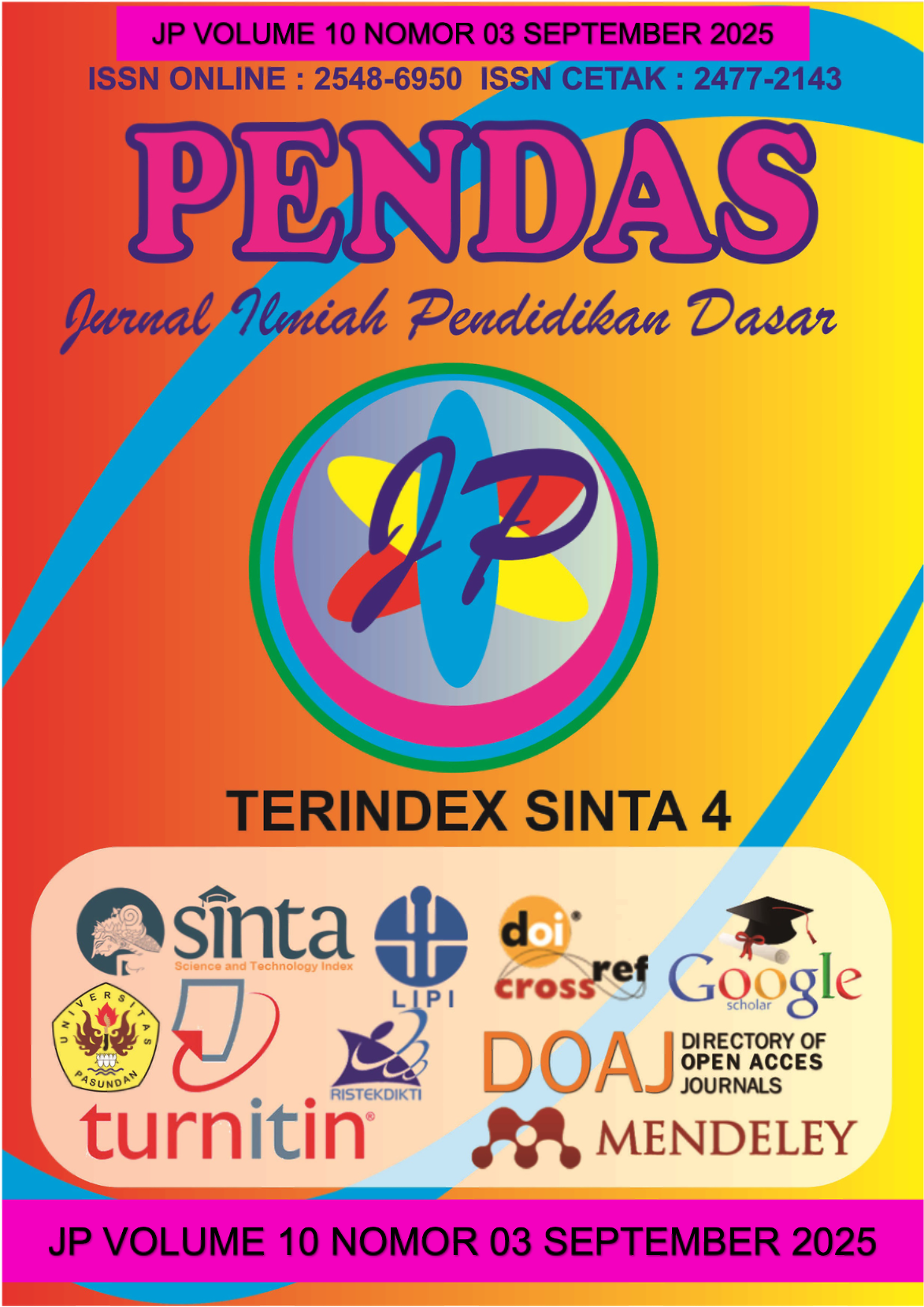Pengembangan LKPD Berbasis Kearifan Lokal Masyarakat Desa Mbengan Pada Materi Keunikan Kebiasaan Masyarakat di Sekitarku di SDK Mok Kabupaten Manggarai Timur
DOI:
https://doi.org/10.23969/jp.v10i03.33117Keywords:
LKPD, Local Wisdom, ADDIE, IPAS, Learning OutcomesAbstract
Local wisdom-based worksheets (LKPD) play a crucial role in learning activities. These local wisdom-based worksheets are expected to be utilized by teachers and students at SDK Mok to enhance their knowledge and learning outcomes in science. The purpose of this study was to determine the feasibility, attractiveness, and effectiveness of a local wisdom-based worksheet in improving student learning outcomes on the topic of the unique customs of the people around me. The type of research used is research and development, with the ADDIE (Analyze, Design, Development, Implementation, and Evaluation) development model. The data collection techniques used are test and non-test techniques. The data analysis techniques used are initial data analysis techniques and final data analysis techniques. The assessment of LKPD based on local wisdom was validated by three experts with the following results: material experts 80% (very feasible), language experts 97.5% (very feasible), and media experts 78.84% (very feasible). The trial was conducted on a limited basis with 10 students and expanded to 21 students. The results of the validity test showed that 15 questions were valid, reliable (α = 0.956 and α = 0.888), and had a good to very good level of difficulty and discriminatory power. Student learning outcomes increased, from an average pretest score of 60.95 to 91.66 on the posttest. The paired t-test showed a significance value of 0.000 <0.05, which means there is a significant influence of the use of LKPD on student learning outcomes. The N-Gain value of 0.7639 is included in the high category. Teacher responses to LKPD reached 87.5% with a very valid category and student response questionnaires with r counts of 0.490 to 0.867 with a valid category.
Downloads
References
Anggraini, FDP., Aprianti., & Vilda, AVS. (2022). Pembelajaran Statistika Menggunakan Software SPSS untuk Uji Validitas dan Reliabilitas. JURNAL BASICEDU, 6(4), 6491 – 6504.
Alwasilah, A.C. (2020). Pendidikan Berbasis Kearifan Lokal. Bandung: Rosda Karya.
Arikunto, S. (2016). Prosedur Penelitian Suatu Pendekatan Praktik. Jakarta: Rineka Cipta.
Brata, I. B. (2016). Kearifan BudayaLokal Perekat Identitas Bangsa. Jurnal Bakti Saraswati. Diakses pada Hari Minggu 20 Juli 2019. Pukul 00.00 WIB, 05(01), 9–16. https://doi.org/10.1007/s11104-008-9614-4
Cahyaningrum, R. D., Nurjayadi, M., Rahman, A. (2017). Pengembangan E-Module Kimia Berbasis Pogil (Process Oriented Guided Inquiry Learning) Pada Materi Reaksi Reduksi-Oksidasi Sebagai Sumber Belajar Siswa. RPKJ: Jurnal Riset Pendidikan Kimia, 7(1), 59–65. https://doi.org/10.21009/JRPK.071.07.
Fauziah, H., Budiana, D., & Firmansyah, H. (2022). Teachers’ Perceptions of Using Pedagogic Content Knowledge Technology in the Teaching of Physical Education. Budapest International Research and Critics Institute (BIRCI-Journal): Humanities and Social Sciences, 5(3). https://doi.org/10.33258/birci.v5i3.6584.
Fikriyah, N. (2021). Analisis Butir Soal Ulangan Tengah Semester Mata Pelajaran Bahasa Arab Kelas VII Semester Ganjil SMP Muhammadiyah 1 Yogyakarta Tahun Ajaran 2019/2020. Maharaat: Jurnal Pendidikan Bahasa Arab, 3(2), 128–140. https://doi.org/10.18196/mht.v3i2.10501
Lioba, Roswita Nahak. Feka, V. (2022). Ethnomathematics Exploration of Matamusan Culture Tetun Tribe Communities in Malaka District. Daya Matematis : Jurnal Inovasi Pendidikan Matematika, 10(3), 212–222.
Nitte, Y.,& Bulu, V. (2020). Pemetaan Implementasi Pendidikan Karakter di Sekolah Dasar Sekota Kupang.Jurnal Kependidikan:Jurnal Hasil Penelitian dan Kajian Kepustakaan di Bidang Pendidikan, Pengajaran dan Pembelajaran,6(1).
Nurmahudina, S., Distrik, I. W., & Wahyudi, I. (2019). Pengaruh Penggunaan Lembar Kerja Peserta Didik (LKPD) Berbasis Exclusive pada Pembelajaran Alat Optik Terhadap Kemampuan Berpikir Kreatif. Tarbawi: Jurnal Ilmu Pendidikan, 15(2). Retrieved from https://ejournal.iainkerinci.ac.id/index.php/tarbawi/article/view/347.
Pane, A., & Darwis Dasopang, M. (2017). Belajar Dan Pembelajaran. FITRAH:Jurnal Kajian Ilmu- Ilmu Keislaman, 3(2), 333.https://doi.org/10.24952/fitrah.v3i2.945
Setiadi, A., Yuliatmojo, P., & Nurhidayat, D. (2018). Pengembangan Aplikasi Android Untuk Pembelajaran Pneumatik. Jurnal Pendidikan Vokasional Teknik Elektronika (Jvote), 1(1), 15 Https://Doi.Org/10.21009/Jvote.V1i1.6886
Setyosari, Punaji. 2016. Metode Penelitian Pendidikan & Pengembangan. Jakarta: Prenadamedia Group.
Sugiyono. (2018). Metode Penelitian & Pengembangan. Bandung : Alfabeta.
Downloads
Published
Issue
Section
License
Copyright (c) 2025 Pendas : Jurnal Ilmiah Pendidikan Dasar

This work is licensed under a Creative Commons Attribution 4.0 International License.














































